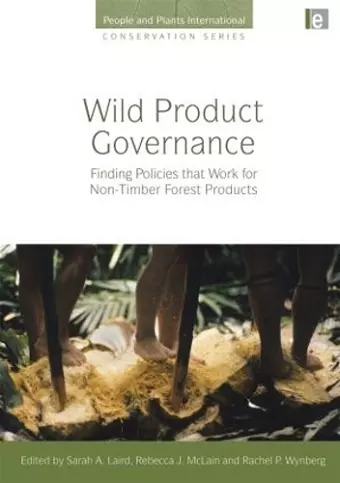Wild Product Governance
Finding Policies that Work for Non-Timber Forest Products
Rebecca J McLain editor Sarah A Laird editor Rachel P Wynberg editor
Format:Hardback
Publisher:Taylor & Francis Ltd
Published:26th May '10
Currently unavailable, and unfortunately no date known when it will be back
This hardback is available in another edition too:
- Paperback£55.99(9780415507134)

Products from the wild, also known as non-timber forest products (NTFPs), are used as medicines, foods, spices, and a multitude of other purposes. They contribute substantially to rural livelihoods, generate revenue for companies and governments, and have a range of impacts on biodiversity conservation. However, there is little information available for those seeking to develop effective policy frameworks and regulation.
This book addresses that shortage with information and recommendations on the drafting, content and implementation of NTFP policies, and the broader issues of governance associated with these products. It reviews the diverse elements that combine to create laws and policies that promote sustainable and equitable management, trade and use of species. Drawing on a wealth of unique case studies from around the world, this volume examines experiences with NTFP regulation, including its sometimes unintended consequences. It looks at economic factors, the interface between traditional and western knowledge and legal systems, and relationships between NTFP regulation, land tenure and resource rights, as well as power and equity imbalances. The volume includes a review of available literature and resources, plus an annotated bibliography linked to the People and Plants International website (www.peopleandplants.org).
Published with People and Plants International
"I can think of no other group of resources that is so important, yet so poorly regulated, than wild products... This timely book does a terrific job of providing a context for improving policies related to the harvest and trade of wild resources. What are the major issues, what works, what clearly doesn't work, and what are the best alternatives? There is a lot to absorb - and hopefully apply - here. The editors are to be congratulated for assembling such a thoughtful and informative collection of papers." - Charles M. Peters, Ph.D., Kate E. Tode Curator of Botany, The New York Botanical Garden
"It is high time to move from anecdotes and eclectic studies on NTFPs to democratic and sustainable plans that foster diverse livelihoods and new relationships to nature. In an exciting work of truly global scope -- drawing on experiences from Mexico to India -- Laird, McLain, and Wynberg have done just that, assembling readable and cutting-edge proposals, which link grounded cases with general principles to fundamentally rethink the rules that govern forests around the world. Researchers in human ecology, forestry, geography, rural sociology, and anthropology will find compelling findings and methods, while resource managers will find real world experiences and practical and implementable principles." - Paul Robbins, Professor and Head, School of Geography and Development, University of Arizona, USA
"Before they became products with international markets, celebrity promoters, and an acronym, wild harvested species formed the basis of subsistence livelihoods for communities all over the world. For centuries, these resources were overlooked or ignored by the central governments of most of the countries in which they occur. And then, suddenly, in response to a variety of economic, political, and conservation pressures, it became clear to policymakers that it was time to finally 'do something' about wild products. Over the past few decades, these attempts at governance have produced a bewildering array of laws, tax structures, permit schemes, and policy frameworks that are, at best, confusing and marginally effective. I can think of no other group of resources that is so important, yet so poorly regulated. This timely book does a terrific job of providing a context for improving policies related to the harvest and trade of wild resources. What are the major issues, what works, what clearly doesn't work, and what are the best alternatives? There is a lot to absorb - and hopefully apply - here. The editors are to be congratulated for assembling such a thoughtful and informative collection of papers." - Charles M. Peters, Ph.D., Kate E. Tode Curator of Botany, The New York Botanical Garden
'The book presents a balanced and considered tour of the key governance issues connected with NTFPs… it will make a useful addition to the bookshelves of researchers, decision-makers, and practitioners with a general interest in forest governance, biodiversity conservation, land and resource tenure, community forestry, and enterprise development.' - Bianca Ambrose-Oji, Mountain Research and Development
"In sum, Wild Product Governance is a highly recommendable volume for ‘picking’ data from diverse case-studies, policy recommendations, and bibliographic annotations."Melissa Ceuterick, Research Institute for Nature and Forest (INBO), Belgium, in Economic Botany
ISBN: 9781844075003
Dimensions: unknown
Weight: 884g
422 pages